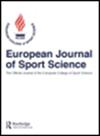“Despite being an athlete, I am also a human-being”: Male elite gymnasts’ reflections on food and body image
IF 3
3区 医学
Q2 SPORT SCIENCES
引用次数: 3
Abstract
ABSTRACT Our aim was to investigate the prevalence of symptoms related to eating disorders, disordered eating and body image perception, and attitudes toward eating in a group of elite male artistic gymnastics. Seventeen athletes took part in this quali-quantitative, cross-sectional study. Presence of eating disorders symptoms, and body image perception and satisfaction were assessed using validated questionnaires. Focus groups were held to discuss their attitudes toward eating and body image perception in more detail. Little to no evidence of symptoms consistent with eating disorders was observed, and this was supported by the qualitative data. However, some concerning practices and attitudes were described. Negative emotional eating cycles appeared prevalent (e.g. feelings of anger, stress and anxiety creating a desire to eat “junk foods”, followed by guilt and regret). Body image perception and attitudes toward body weight’s influence on performance varied widely. Some athletes expressed a desire to lose weight and believed that this would positively impact their performance, while others believed weight to be irrelevant and focused on feeling strong and vital. Athletes believed their female counterparts experienced far greater pressure to maintain low body weight and described some very concerning practices. We conclude that eating disorders and disordered eating did not appear to be prevalent among these elite male artistic gymnastics. However, some concerning attitudes and practices were observed and should be addressed with nutritional support programmes encompassing psychological and behavioural aspects of eating. These programmes should be extended to support staff and significant others, in addition to athletes.“虽然是运动员,但我也是人”:男性体操精英对食物和身体形象的思考
我们的目的是调查一组优秀艺术体操男运动员饮食失调、饮食失调和身体形象感知的患病率以及对饮食的态度。17名运动员参加了这项定性定量的横断面研究。进食障碍症状的存在、身体形象感知和满意度使用有效的问卷进行评估。焦点小组讨论了他们对饮食和身体形象感知的更详细的态度。几乎没有观察到与饮食失调相一致的症状的证据,这得到了定性数据的支持。不过,也叙述了一些有关做法和态度的问题。消极的情绪饮食循环似乎很普遍(例如,愤怒、压力和焦虑的感觉产生了吃“垃圾食品”的欲望,随后是内疚和后悔)。身体形象感知和对体重的态度对成绩的影响差异很大。一些运动员表达了减肥的愿望,并相信这将对他们的表现产生积极影响,而另一些人则认为体重无关紧要,他们专注于感觉强壮和有活力。运动员认为,她们的女对手在保持低体重方面承受了更大的压力,并描述了一些非常令人担忧的做法。我们的结论是,饮食失调和饮食失调在这些优秀的男性艺术体操运动员中似乎并不普遍。但是,观察到一些关于态度和做法的问题,应通过包括饮食心理和行为方面的营养支助方案加以解决。除了运动员之外,这些方案还应扩大到支助工作人员和其他重要人员。
本文章由计算机程序翻译,如有差异,请以英文原文为准。
求助全文
约1分钟内获得全文
求助全文
来源期刊
CiteScore
6.60
自引率
3.10%
发文量
153
审稿时长
6-12 weeks
期刊介绍:
The European Journal of Sport Science (EJSS) is the official Medline- and Thomson Reuters-listed journal of the European College of Sport Science. The editorial policy of the Journal pursues the multi-disciplinary aims of the College: to promote the highest standards of scientific study and scholarship in respect of the following fields: (a) Applied Sport Sciences; (b) Biomechanics and Motor Control; c) Physiology and Nutrition; (d) Psychology, Social Sciences and Humanities and (e) Sports and Exercise Medicine and Health.

 求助内容:
求助内容: 应助结果提醒方式:
应助结果提醒方式:


